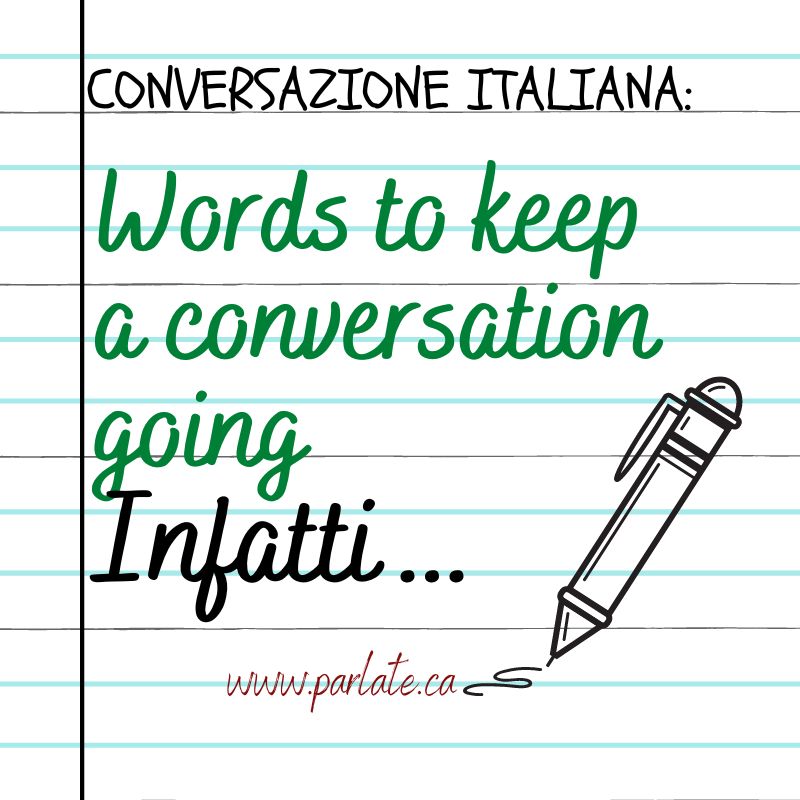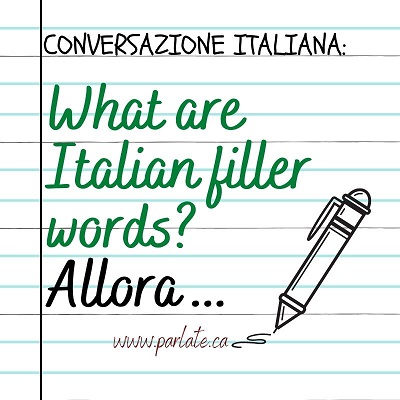Abbiamo precedentemente visto come in italiano le ‘parole riempitive’ o ‘intercalari’ siano usate in abbondanza. Infatti la lista era interminabile!
Ma esiste anche un’altra categoria di parole ed espressioni che vengono usate per mantenere viva una conversazione. Queste parole ed espressioni aiutano anche a comunicare il nostro accordo, disaccordo e incertezza senza interrompere l’interlocutore.
Ecco una lista di alcune delle più comuni.
We have already seen how in Italian the “filler words”, ‘parole riempitive’ o ‘intercalari’ are used in abundance. In fact, the list was endless! But there is also another category of words and expressions that are used to keep a conversation going. These words and expressions also help communicate our agreement, disagreement, and uncertainty without interrupting the other party.
Here is a list of some of the more common ones.
Esprimere accordo – expressing agreement
La più popolare in assoluto per esprimere accordo è “infatti”. Si puo’ alternare con le altre espressioni, o ripetere molte volte sopratutto se l’interlocutore non dà segno di voler smettere di parlare!
The most popular by far is “infatti”. You can alternate it with the other expressions, or repeat it many times especially if the speaker shows no sign of wanting to stop talking!
Infatti (indeed)
Direi (I’d say so)
Sono d’accordo (I agree)
Certo (of course)
Senz’altro (certainly)
Come no… (of course)
Vero (True)
Verissimo (very True)
Bene (Good)
Esprimere disaccordo – expressing disagreement
Quando vuoi restare cortesemente in disaccordo con poche parole e senza interrompere chi parla:
When you want to politely disagree with a few words and without interrupting the speaker:
Non direi (I wouldn’t say so)
Ma no (Can’t be)
Al contrario (on the contrary)
Ma dai… (Come on)
Non credo (I don’t think so)
Esprimere incertezza – Expressing uncertainty
Queste parole possono incoraggiare l’interlocutore a fornire ulteriori informazioni:
These words can encourage the speaker to provide more information:
Dici? (Do you think so?)
Non so (I don’t know)
Mah… (Perhaps…)
Davvero? (Really?)
Credi davvero? (Do you really think so?)
Potrebbe essere (Could be)
Esempio misto:
– Domani ci sarà lo sciopero dei trasporti….
– Davvero?
-…e io devo prendere il treno, è pazzesco! Il sistema dei trasporti è un disastro…
– …infatti…
– Vedrai che lo sciopero durerà tutta la settimana!
– Ma no…
– Non ci credi? Scommettiamo che ho ragione!
Mixed example:
– Tomorrow there will be a transport strike ….
– Really?
– … and I have to take the train, it’s crazy! The transport system is a mess …
– …indeed…
– You’ll see the strike will last all week!
– Come on…
– You don’t believe it? We can bet I’m right!
- 10 idee per studiare italiano in estate o in vacanza

- 25 verbi riflessivi in italiano

- 3 ways to pronounce the s in Italian

- 32 frasi ipotetiche del primo tipo in italiano

- 32 frasi ipotetiche del secondo tipo in italiano

- 6 significati del verbo trovare

- 60 verbi italiani per viaggiare #1

- 60 verbi italiani per viaggiare #2

- 7 “ricette” per praticare i verbi











